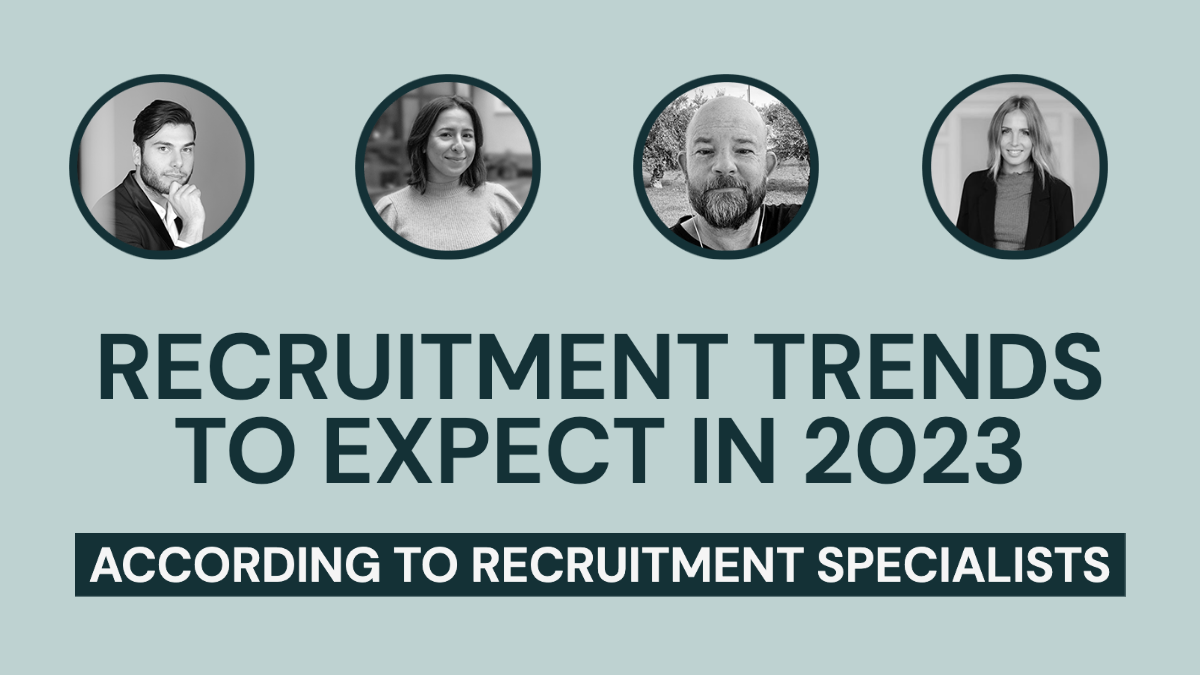Recruitment trends that will dominate 2022 according to recruitment specialists
The pandemic has been a fundamental factor in the way we recruit.
Location does not play a significant role in most jobs, the gig economy is increasing, and automation is used more often to find relevant candidates. These are some of the few changes that defined the last two years in recruitment.
With recruitment evolving at a rapid pace, numerous trends have made their way into the process. But which ones should you pay attention to?
We contacted specialists in HR and recruitment, as well as the experienced team at RecRight, to share their knowledge and asked them two questions:
1. What is a recruitment trend you’re expecting to see more of in 2022?
2. What is one piece of advice you would like to give recruiters to succeed in 2022?

1. What is a recruitment trend you’re expecting to see more of in 2022?
“The future of recruitment will focus on following the “post-pandemic” workflows. Different industries have had different consequences during and after the pandemic and it is clear who needs recruitment now and in the future.
As a Recruitment Consultant, I see a big difference in the candidate market, especially in the IT segment. Job hopping is on the rise and changing jobs is not as much of a big deal as it was just ten years ago. This is due to the fact that a large part of our work has become remote and people are not as dependent on their physical workgroups. For better or worse, of course.
A direct consequence of this is that loyalty to the employer decreases and the grass will always be greener on the other side for the candidates.
In the end, we will get tired of the remote work and wish to go back to the social and physical environment. We will form subgroups at the workplace and remote workgroups will become the new norm. One day we sit with a project team and the other day with another. The way of working becomes even more agile and cross-functional.
The boundaries between IT and the business are getting blurrier and IT becomes an integral part of the business. In the future, “motivation-based recruitment” will become the trend, while soft values such as motivation, drive and attitude will become determinants when searching for the right candidates.
The lack of skills means that employers will initiate more and more in-house training and the old honest trainee system is gaining momentum like never before. Success will be defined by customised and structured training and onboarding processes where organisations develop their employees’ loyalty and skills. This will establish a good foundation for a low turnover rate.”
2. What is one piece of advice you would like to give recruiters to succeed in 2022?
“The winners are those who can balance their external employer branding with their internal work culture and at the same time execute valuable activities for the employees. It is important to conduct different activities for different employees, not everyone likes the same things.
Give your employees a clear performance ladder where they can gradually “step up” to a new level every year.
Hiring talent acquisition managers continues to be an important strategy, but winners realise that this is a task for seniors, not juniors. Allow senior recruiters to search and attract candidates, not the other way around. Who can better attract new talent and see who is more suitable than the more experienced recruiters?
AI is becoming more important than ever, but there are still shortcomings around it. That is why businesses will focus on building teams with different qualities and soft values, features that AI lacks. We will take command and lead the technology instead of the other way around.
Allow human abilities to combine with AI in the selection and matching processes. After all, we are people with emotions and driving forces, something that machines will never be able to fully learn but only be able to supplement and, to some extent, automate.”

1. What is a recruitment trend you’re expecting to see more of in 2022?
“I think we are even more so leaning into a candidates’ market in terms of hiring talent. The war for talent doesn’t seem to come to peace any time soon. In order to attract talent, organizations will have to continue working with their employer brand.
I believe two things will be extra important in 2022:
The first one is to allow flexibility in terms of workplace and working hours and to showcase that to potential candidates. The pandemic has taught us several things, one of them being that we can get the job done outside of the office.
The second thing would be to truly engage in sustainability work. This is something that is becoming increasingly important when candidates are choosing their next employer, especially as Gen Z enters the workforce. Therefore, I think more companies will be working with sustainability and promoting that to potential candidates.”
2. What is one piece of advice you would like to give recruiters to succeed in 2022?
“The other week I saw a post from a recruiter giving advice on how to get more personal with the candidate during an interview and get to know them better. The recruiter suggested asking questions like ”If you were an animal, what animal would you be?”, and ”What qualities do you like in your mother?”.
While I am of the opinion that every company needs to find their own ways of best practices, I would suggest staying away from questions like these that are difficult to measure. By instead working more competency-based and focusing on what is actually relevant for the role, you can avoid discrimination and gut feeling, hence making fairer decisions.”

1. What is a recruitment trend you’re expecting to see more of in 2022?
“HR tech for good. The workplace has experienced an unstoppable digital revolution, and HR departments and leaders need to become digitally savvy to be able to leverage the technology that is being developed to benefit their organization and employees.
HR leaders should prepare now to stay ahead of the curve, by adding value with data-driven literacy will help C-Suite and management drive better business performance.”
2. What is one piece of advice you would like to give recruiters to succeed in 2022?
“The pandemic has fundamentally changed why we want to work and what we value in our jobs. With a lack of talent available, making the candidate experience memorable will be key to winning and maintaining talent. Having open and honest communication with candidates will make a candidate-centric experience that will have long-term benefits.
Candidates don’t appreciate generic statements, undefined expectations and feeling left in the dark. Focusing on culture alignment for potential hires will lower the cost of mis-hires and increase retention across teams and departments.”

1. What is a recruitment trend you’re expecting to see more of in 2022?
“Besides the obvious digital interviews, I think we will start to see much more AI-based systems that support the recruiter in all distinct parts of the process.”
2. What is one piece of advice you would like to give recruiters to succeed in 2022?
“My advice is to study the validity of different selection processes and choose the right ones for the selected job, and also check the ISO standard ISO 10667 for assessment.”

1. What is a recruitment trend you’re expecting to see more of in 2022?
- “I would say remote/hybrid work continues also in 2022, thus also remote recruiting plays a very important role and companies who are not yet doing it need to start looking into how they can recruit remotely. Not sure if this is anything new though, this has been very relevant already for 2 years now.”
- “Heavier focus on using different channels for employer branding, especially on social media (LinkedIn, TikTok).”
- “Companies invest in and support mental health.”
- “Re-designing Employee Experience Around Well-Being.”
2. What is one piece of advice you would like to give recruiters to succeed in 2022?
- “Going back to the basics: be open to change more than ever and listen to the needs and wished of job seekers/resignees in order to nurture and retain your employees.”
- “More transparency and inclusion. Candidates are more and more demanding of recruiters and expect to be treated fairly and have a clear picture of what they’re getting themselves into e.g. clear expectations, requirements, potential tasks, transparency on salary expectations and the entire hiring process.”
Our predictions
Although research shows that the number of resumes sent to a job advertisement can reach hundreds, the quantity doesn’t mean much for talent acquisition specialists. If anything, there is a common challenge among many organisations to find and select talent in this pool of candidates.
That is why recruiters will benefit from using HR Analytics to make data-driven decisions when selecting relevant candidates directly from their database. Organizations are mainly using HR Analytics to improve internal strategies and employee satisfaction. However, HR Analytics will take an important role in identifying and hiring the right talent.
The gut feeling will disappear from the initial stages of recruitment, while the subconscious bias will be replaced with clear reasoning behind the selection process. This will allow organisations to hire teams with a focus on diversity and growth potential.
Although soft skills continue to be a must-have in almost every job description, recruiters will shift focus towards hard skills and experiences which allow candidates to develop professionally and climb up the career ladder faster.
 By
By


